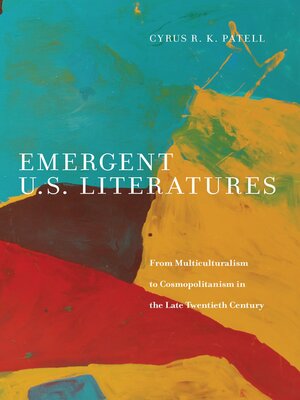Emergent U.S. Literatures
ebook ∣ From Multiculturalism to Cosmopolitanism in the Late Twentieth Century
By Cyrus Patell

Sign up to save your library
With an OverDrive account, you can save your favorite libraries for at-a-glance information about availability. Find out more about OverDrive accounts.
Find this title in Libby, the library reading app by OverDrive.



Search for a digital library with this title
Title found at these libraries:
| Library Name | Distance |
|---|---|
| Loading... |
Emergent U.S. Literatures introduces readers to the foundational writers and texts produced by four literary traditions associated with late-twentieth-century US multiculturalism. Examining writing by Native Americans, Hispanic Americans, Asian Americans, and gay and lesbian Americans after 1968, Cyrus R. K. Patell compares and historicizes what might be characterized as the minority literatures within "U.S. minority literature."
Drawing on recent theories of cosmopolitanism, Patell presents methods for mapping the overlapping concerns of the texts and authors of these literatures during the late twentieth century. He discusses the ways in which literary marginalization and cultural hybridity combine to create the grounds for literature that is truly "emergent" in Raymond Williams's sense of the term—literature that produces "new meanings and values, new practices, new relationships and kinds of relationships" in tension with the dominant, mainstream culture of the United States. By enabling us to see the American literary canon through the prism of hybrid identities and cultures, these texts require us to reevaluate what it means to write (and read) in the American grain. Emergent U.S. Literatures gives readers a sense of how these foundational texts work as aesthetic objects—rather than merely as sociological documents—crafted in dialogue with the canonical tradition of so-called "American Literature," as it existed in the late twentieth century, as well as in dialogue with each other.







